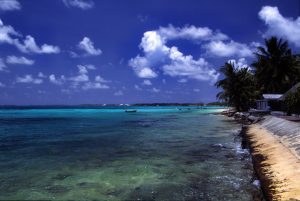Climate change is destroying our world as we know it. The Pacific Island countries have been hit hardest by its effects, forcing them to take drastic measures to adapt. Tuvalu, in particular, is the world’s most vulnerable country, but it has also been an international leader in its adaptation efforts. As Tuvalu’s foreign minister said in his address to last year’s U.N. climate change conference, Pacific Island countries cannot afford to “sit idly by” as the climate crisis progresses: “The world has not acted, so we in the Pacific have had to act.”
Climate change and the rise of sea levels have challenged Tuvalu’s sovereignty, forcing the nation to find extremely innovative solutions. A multifaceted adaptation approach is under way, focusing on both the physical and digital worlds.
Tuvalu, formerly known as the Ellice Islands, consists of nine islands located in the South Pacific Ocean. Its total population is 11,000; it is the fourth smallest country in terms of area following Vatican City, Monaco, and Nauru. After gaining independence from Great Britain in 1978, Tuvalu remains a member of the Commonwealth, having King Charles III as head of state. It is a parliamentary democracy with a unicameral parliament consisting of 16 members without political parties.
Tuvalu’s total area is 26 square kilometers (10 square miles), but the nation has been losing land as the sea level continues to rise. Tuvaluans living on the shores have been forced to relocate, causing arguments over land ownership.
One of Tuvalu’s adaptation strategies is thus the reclamation of land through dredging. Dredging is the process of removing sedimentary and debris from the bottom of bodies of water. The sediment is brought to the surface and used to fill large sandbags, which are layered to construct the reclaimed land.
As part of the Tuvalu Coastal Adaptation Project, land reclamation has been undertaken on the main island of Funafuti, but also on the outer islands of Nanumea and Nanumaga. Queen Elizabeth Park, which holds the Dr. Sir Tomasi Puapua Convention Center, sits on reclaimed land. Additionally, a large reclamation of land project in Funafuti recently finished and residents living in areas most susceptible to flooding will be relocated there.
This adaptation strategy has many benefits. First, it mitigates the immediate threats posed by rising sea levels, and the new land can act as a buffer zone to the existing land. Tuvaluans can live safely without the urgent threat of sea level rise destroying their property.
Land reclamation has increased Tuvalu’s climate resilience in other ways as well. The country will now have better protection against saltwater intrusion, preserving habitable areas. Moreover, sustainable infrastructure such as sea walls and other protective measures can be taken for further defense.
In addition, as sea levels rise, the sovereignty of low-lying nations such as Tuvalu will be protected by maintaining its land and maritime boundaries. Land reclamation is an important part of that effort. Just as importantly, Tuvaluan culture and social identity will be preserved along with the land. Tuvaluans’ identities are strongly rooted in their land, and they can maintain that connection as they remain on their ancestral lands, carrying on with their traditional way of life.
Finally, reclaimed land offers economic opportunities such as the construction of facilities or ports. The additional revenue collected from these economic activities can be reinvested to further increase the climate resilience of Tuvalu.
The reclamation of land in Tuvalu has been and will continue to be a successful component of its overall climate adaptation strategy. But it is far from the only piece of the puzzle.
Technology is rapidly evolving and its advancements are being utilized to adapt to the effects of climate change. At COP27, Simon Kofe, Tuvalu’s minister of foreign affairs at the time, announced that his country would become the first digital nation. Tuvalu has partnered with consulting firm Accenture to build Tuvalu in the metaverse.
From photographs and videos, an immersive 3D experience has been created. Tuvalu made use of technology like Unreal Engine 5 and Lumin, to produce accurate wave sounds and light effects that are also included in the experience. The islet of Te Afualiku was the first part of the country to be constructed in the metaverse, as it is predicted to be the first to submerge.
The Digital Nation Initiative has significant benefits. First and foremost, it is another means to preserve Tuvalu’s national identity. A digital nation represents Tuvalu’s identity in an intangible form, providing the people of Tuvalu with a sense of unity and connection wherever they are located. Descendants of Tuvaluans will forever be able to view their ancestral lands. No matter how high the sea levels rise, Tuvalu will forever be safeguarded in the metaverse, allowing future generations to experience its beauty.
Second, the digital Tuvalu fosters a platform for global collaboration by serving as a hub on climate change. Tuvalu can inform other vulnerable communities around the world of its best practices and lessons learned to develop an International network of knowledge and support. Climate change generates a web of complex challenges that require creative adaptation techniques. Tuvalu’s example will inspire other countries to embrace innovation as part of their climate adaptation strategy.
The far-reaching impacts of climate change present a formidable challenge to Tuvaluans, requiring a multifaceted adaptation approach. Both the reclamation of land and the Digital Nation Initiative are innovative measures for climate adaptation that offer significant benefits. Therefore, both strategies should continue to be undertaken to preserve Tuvalu as the disastrous effects of climate change persist.
Despite being one of the smallest countries in the world, Tuvalu has one of the loudest voices in the climate sphere. Tuvalu must continue to be a climate adaptation leader to show the world there is still hope. As Tuvalu’s former Prime Minister Enele Sopoaga once said, “For if we save Tuvalu, we save the world.”
































